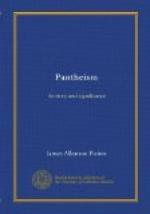According to Spinoza, what constitutes the real essence of the human mind is the (divine) idea of a certain individual creature actually existing.[19] Here, perhaps, modern speculations about the constitution of matter may help us—if we use them with due reserve—to grasp Spinoza’s notion of a “res singularis in actu”—or as it might be rendered freely, “a creature of individual functions,” for what is called the “vortex theory,” though as old as Cartesian philosophy, has recently flashed into sudden prominence. And whether or no the speculation be only a passing phase of human thought about the Unknowable, it equally answers the purpose of illustration. Thus the so-called “ether” is supposed to fill all space; and within it there are imagined or inferred innumerable “tourbillons” or “vortices,” which, though parts of the indefinitely extended ether, form by their self-contained motion little worlds in themselves. These little worlds are by some regarded as the atoms which, by composition, and differentiation, build up our palpable universe. With the possibilities of such a theory I have nothing to do. But the notion of the vortex in the ether may perhaps help us to a glimpse of Spinoza’s notion when he speaks of a “res singularis in actu” a creature of individual functions. For to him man was, as it were, an infinitesimal vortex in a phase or attribute of the divine Substance. The analogy, like all other analogies, would not bear being pressed. But it does suggest to us a picture of finite individuality in action or function, subordinated to unity with infinite Substance. If it be said that such an explanation would necessarily include the conscious life of beasts and birds, the answer would seem to be, that admitting this to be the case, yet in man the divine idea of individuality is more fully expressed and has more of reality than in any lower creature.
[Sidenote: Moral Difficulties.]
Man, then, according to Spinoza, is in God and of God. But what are we to say of bad men, the vile, the base, the liar, the murderer? Are they also in God and of God? Spinoza does not blench. Yes, they are. But here comes in his doctrine of “adequate” and “inadequate ideas.” Thus, if you see the colour red it completely expresses itself. It cannot be defined and needs no explanation.[20] As it is in the Infinite Thought so it is in ours. We have an “adequate idea” of it. But now if you see on an artist’s canvas a splotch of red and blue and yellow, part of a work only begun, it gives you no adequate idea. True, you have an adequate idea of each several colour, but not of their relations to the work conceived. To get that you would have to enter into the mind of the artist and see as he sees. Then the splotch of colour would take its place as part of a harmonious whole; and would give you an adequate idea just as it does to the artist.
[Sidenote: But the Universe Is Not an Unfinished Picture.]




